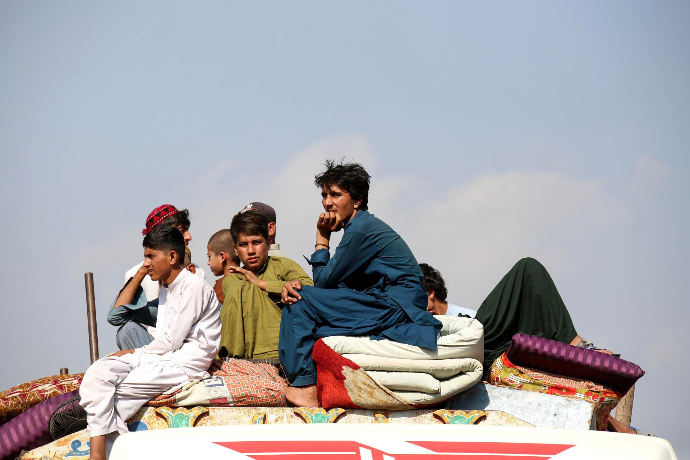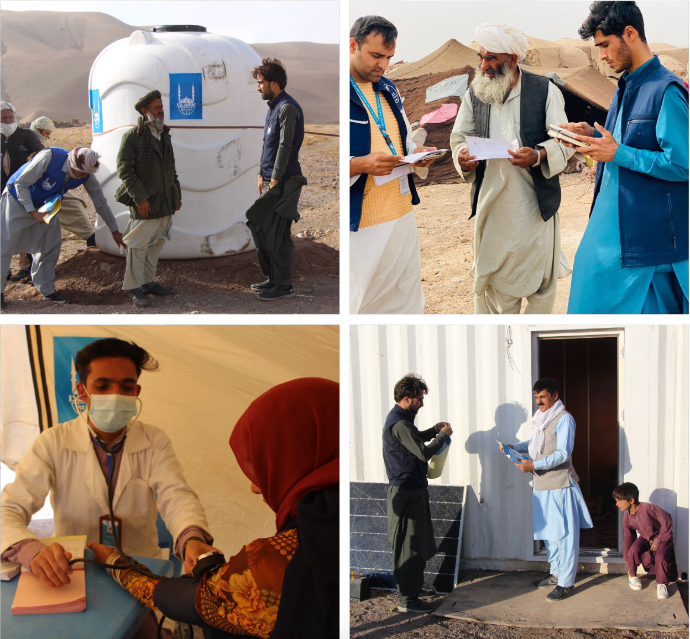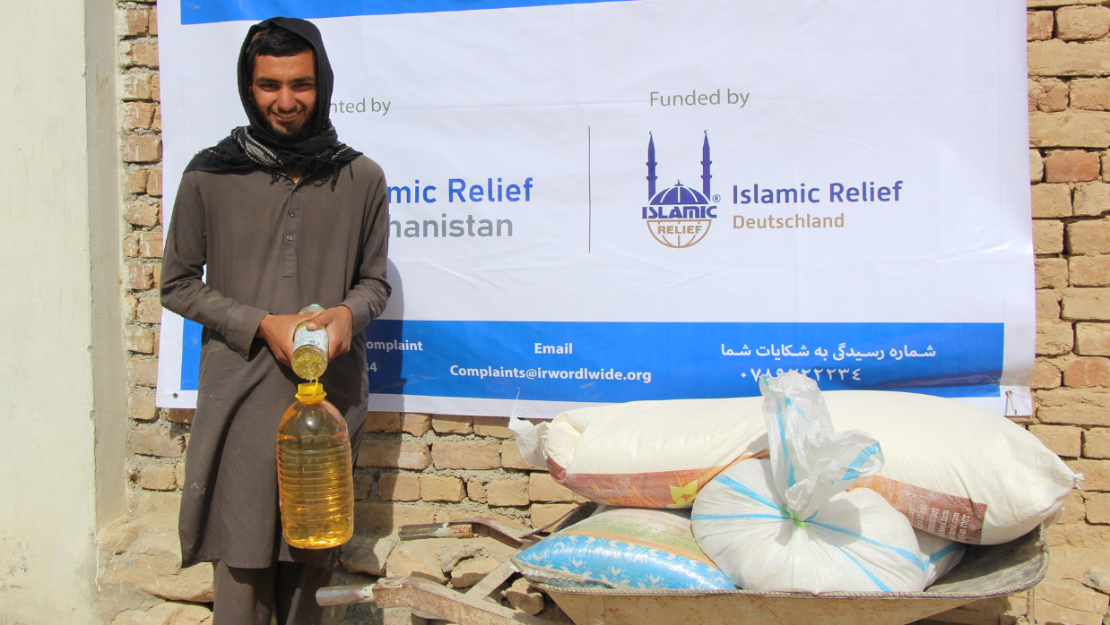22M+
0
people facing acute food insecurity
8M+
0
people just one step away from famine
Support Afghans Affected by the Refugee Crisis
Since mid-September, more than 120,000 Afghans have been forced to cross from Pakistan into Afghanistan – facing a deadline that all undocumented refugees must leave the country by October 31. Crossings are now speeding up, with up to 12,000 people a day now crossing the border. This crisis has the potential to impact up to 1.7 million Afghan refugees.
People are undergoing an extremely tough journey, and many are arriving in Afghanistan in terrible conditions, which is only exacerbated in the aftermath of consecutive earthquakes. Families are facing shortages of food, clean water, sanitation and other basic necessities. With winter approaching, they will soon be exposed to freezing sub-zero temperatures.
Islamic Relief is on the ground providing health assistance, clean water, multi-purpose cash grants, and household kits to affected Afghan refugee families.
Please support our emergency response to the Refugee Crisis today, giving anything you can to help save lives.
Powerful earthquakes kill thousands near Herat, Afghanistan
1,400 + killed | 43,000 + affected
Weeks of back to back catastrophic earthquakes and aftershocks have injured thousands and killed over 1,400 people. This latest tragedy follows years of crisis and hardship for many in the region, including recently returned refugees and internally displaced people.
The three most powerful earthquakes include one 6.3 magnitude on October 7 2023, one 6.3 magnitude on October 11 and a 6.4 magnitude earthquake on October 15. In the most affected districts, 150,000 people completely lost their homes or sustained severe damage.
Help Islamic Relief continue to provide health support, cash assistance, and emergency relief in earthquake-affected areas today.

How will your donations help people in Afghanistan?
Alongside keeping Afghanistan in our prayers, we have a duty to not turn our back on the people of Afghanistan. You can help ease the burden of catastrophic earthquakes and the ongoing refugee crisis by donating towards our life-saving work in communities for families across Afghanistan.
For families impacted by the ongoing refugee crisis, you can support them through:
-
$80 can provide hygiene, water storage kits and basic essentials
-
$150 can provide clean drinking water
-
$250 can help provide health and sanitation services
You can also help send relief to earthquake-affected communities today.
-
$80 can provide water and hygiene kits to a displaced family
-
$150 can provide food to a displaced family for a month
-
$750 can provide a displaced family with emergency shelter
The Crisis in Afghanistan
Your Donations in Action in Afghanistan
2.8 million Afghans are on the verge of facing a catastrophic famine, and their lives are at stake. The situation is further compounded by a collapsing economy and rising poverty, and with harsh natural disasters and climate conditions – the situation is getting more desperate by the day.
The head of the World Food Programme has described the situation unfolding in Afghanistan as “the worst humanitarian crisis on earth”.
Even prior to October’s deadly earthquakes, more than 29 million people — two thirds of the Afghan population — needed humanitarian aid and protection.
Millions of Afghans, especially women, are going for days without food, desperately selling their belongings to be able to feed their families. Families have resorted to selling anything they have left of value, and tragically, children as young as five are being forced to work for more than twelve hours a day to afford their families a meal.
For people across Afghanistan, life is incredibly challenging:
-
18.8 million people across all 34 provinces in Afghanistan are experiencing crisis level or high food insecurity
-
1 out of every 5 families in Afghanistan have been forced to send their children out to work
-
97% of Afghans are at risk of poverty
-
3 million children under five are expected to suffer from malnutrition, and 1 million of these children are at risk of dying
Your donations to Afghanistan are funding vital emergency and development programs across the country, reaching over 68,420 Afghans.
Where have your donations gone since the earthquake?
Some other examples of our work includes:
Providing 2,500 food packs containing wheat flour, oil, rice, sugar and other staple items to communities in Nangarhar, Balkh, Herat and Kandahar
In underserved communities, enrolling women in classes where they undergo literacy, vocational and life-skills training
Installing clean water systems, handwashing points and latrines, as well as distributing water storage, hygiene items and dignity kits to vulnerable displaced people, returnees and host communities in settlement areas across the Nangarhar province

A Story of Hope: Sher Agha in Afghanistan
Residing in Kabul, Afghanistan, Sher Agha is a 19 year old son and the sole breadwinner of his household. He dropped out of school to work in the fields, harvesting crops and earning an income for his family of 4.
“I wish to have the opportunity to study in school. But because of the current crisis, I don’t go to school and instead work every day to support my family. I need to earn income and provide them with the basic needs of life.”

Sher Agha hopes to one day earn enough to meet his family’s basic needs. Still, with his father unable to work due to a terrible accident and his two older brothers murdered in conflict, Sher Agha finds it very difficult to make ends meet, especially during a time of immense devastation.
“Most of the time, we don’t have enough food and some nights we all sleep with empty stomachs.”
Through Islamic Relief’s food pack distributions, Sher Agha and his family did not have to worry about buying food for a month. Instead, they were able to enjoy eating nutritious meals while allocating their finances to other essential needs. He gratefully shared,
“Receiving the food pack has made me so happy knowing that it can support my family.”
Islamic Relief on the ground in Afghanistan
Islamic Relief has been a leading charity in Afghanistan since 1992. We were one of the few charities working in Afghanistan during the military incursions, and we have offices in Kabul, Herat, Bamyan, Nangarhar and Balkh.
Together with local communities, government agencies, and partners on the ground, we’re working to tackle food insecurity, poverty, poor sanitation and hygiene practices, and more.
Community remains central to our work, and we’re cultivating more collaboration and community-led work to make sure the needs of the Afghan communities we are serving are met first and foremost. This ensures the communities we are servicing retain the tools and knowledge to be self-sufficient and break the cycle of poverty.
And yet, there is still so much more that needs to be done.
Donate to Afghanistan and help us bring urgent relief today.